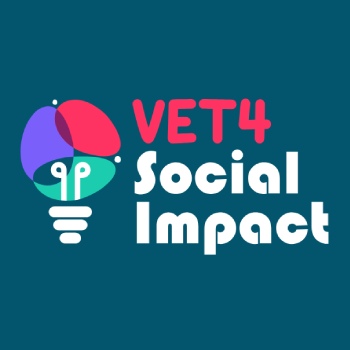VET4SocialImpact

Erasmus+
101183299
Visit the Project's Website
VET4SocialImpact
Objectives of the project
The objectives of the project are the following:
- Help local TVET key players develop the skills they need to be more competitive, sustainable, and efficient by adopting an entrepreneurial mindset.
- Drive innovation in the entrepreneurship and self-employment sectors, with a focus on social enterprises, self-employment, and using Social Impact Evaluation to support socio-economic development.
- To create an environment for VET tourism clusters to offer integrated, innovative, and effective TVET-business services that connect with public policies and positively impact local communities.
- Support quality processes like strategic planning, peer reviews for quality management and internationalization, MEAL, and impact assessments, alongside advocacy and awareness strategies at local, regional, and policy levels.
- Work towards creating lasting change by integrating social impact evaluations into all the processes, policies, and actions related to social entrepreneurship, job creation, and business development.
Expected Main Results
- The project will improve the skills of TVET providers and managers in areas like school management and evaluation, while students and trainers will benefit from modern teaching methods and increased employability, especially for women and vulnerable groups. Work-based learning programs and start-up incubation will offer real-world experience and job opportunities. Universities, business incubators, and public actors will strengthen their incubation services, benefiting the local community. The social entrepreneurship sector will grow through capacity building and innovation in social impact evaluation. At the national level, Egypt and Palestine will see increased youth employment, stronger VET-social entrepreneurship links, and improved networks, advocacy, and labor quality. Regionally, the VET ecosystem will become more sustainable, fostering TVET-business partnerships and enhancing cooperation and skill-sharing among stakeholders.
Main Activities:
WP1: Project management and coordination
Project management and coordination will involve a variety of key tasks crucial for the successful organization and execution of the project. These tasks include partner meetings, creating a communication and a quality assurance plan, conducting risk assessments, planning activities, monitoring and controlling project tasks and reporting.
WP2: VET ecosystem’s capabilities reinforcement and strengthening of sustainability:
The project includes training modules on the Entrepreneurial CoVE conceptual framework, which covers self-assessment tools for organizational practices, teaching and learning processes, ecosystems, and products and services. These modules will be implemented for Egyptian and Palestinian TVET centers, vocational training centers (VTCs), universities, chambers of commerce, and education/employment agencies. The self-assessment tool will help these institutions evaluate and enhance their practices, aiming to become strategic partners in multi-actor clusters for local development. Additionally, a training module on Digital Strategies will be provided, focusing on online learning and creating digital plans or roadmaps linked to entrepreneurial activities, helping these organizations further integrate digital strategies into their work.
WP3: Innovation through social entrepreneurship and social impact evaluation:
The project includes an initial assessment and mapping of social entrepreneurship in Egypt, focusing on policies, initiatives, models, and best practices, while updating existing data for Palestine. This will help enhance social entrepreneurship as a key driver of socio-economic development. Training and peer-to-peer learning on social entrepreneurship and self-employment will be provided by Palestinian actors to Egyptian TVET centers, vocational training centers (VTCs), universities, chambers of commerce, and education/employment agencies. Additionally, training on Social Impact Evaluation will be offered to Egyptian and Palestinian TVET centers, VTCs, universities, companies, and relevant agencies. Lastly, training on fundraising, marketing, and communication strategies will be provided to these institutions, equipping them with the skills needed to promote and sustain social entrepreneurship initiatives.
WP4: Pilot initiatives on relevant economic clusters:
The project will start with an assessment aimed at creating and strengthening two vocational clusters in the field of community-based tourism—one in Egypt and one in Palestine. This will be followed by the development of long-term strategic plans, including business plans for each cluster partner, yearly action plans, and joint programs to support the development of sustainable and integrated VET-business initiatives for both clusters. Two hackathons on community-based tourism will be organized, one in Palestine and one in Egypt, to encourage innovation in the sector. Finally, an international conference will be held in Egypt to present the results of the hackathons, showcase the development of the clusters, share best practices, and discuss future programs.
WP5: Impact and Dissemination:
The project will begin with a preliminary assessment in Egypt and the development of an evaluation report on the social impact of the vocational clusters in Palestine. Peer review processes will be conducted to assess the quality planning and management of TVET business services, ensuring high standards and continuous improvement. Additionally, a dissemination and communication strategy will be created, along with an operational workplan to ensure the successful implementation and outreach of the project’s activities and outcomes.
Project Partners
- VIS
- CNOS-FAP
- PIN SCRL
- AKMIAE AKMI EDUCATIONAL ORGANISATION
- BETHLEHEM UNIVERSITY
- Don Bosco - Sahel
- CEEBA
- CARDET
- National Commission for Technical Education and Vocational Training
- BCCI


